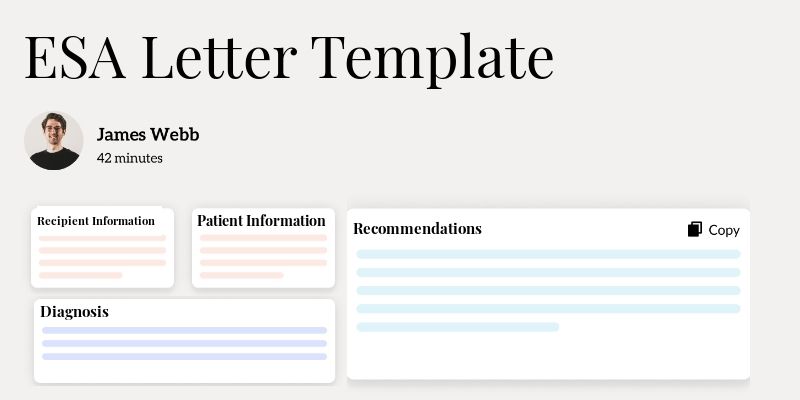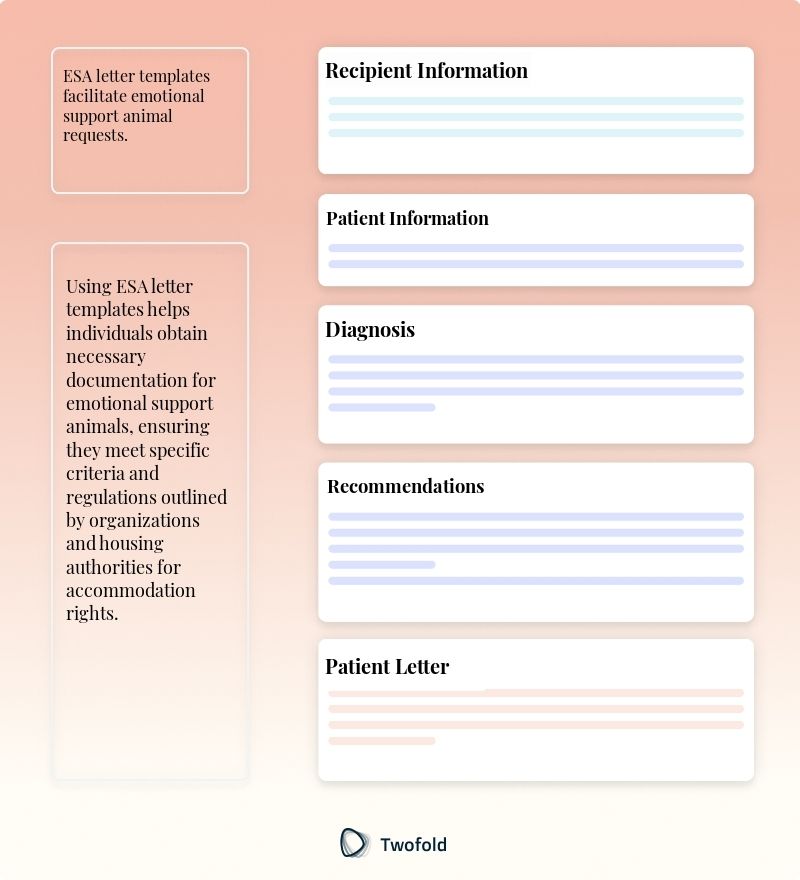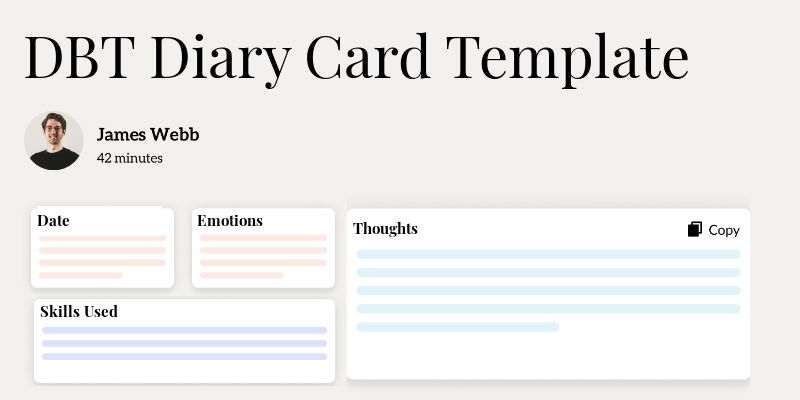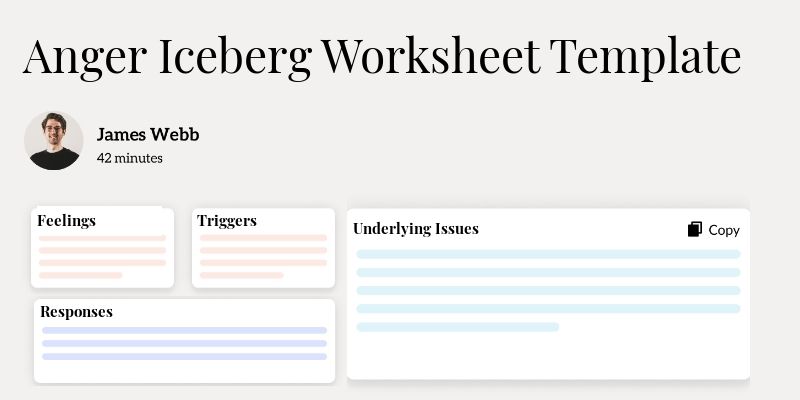
ESA Letter Template
Hey there! If you're reading this, you're probably wondering how to effectively document the process of receiving an ESA letter. Well, you're in luck! This blog post is all about easing the headache that often comes with medical documentation by showcasing an ESA letter template. Whether you're a healthcare provider or a patient eager to learn, we've got you covered. Let's unravel the intricacies together!
What Is an ESA Letter Template?
An ESA (Emotional Support Animal) letter template is a standardized document used by medical professionals to certify that a patient is eligible for an emotional support animal. It's crucial for individuals who need their furry friends to assist with mental health issues.
This template provides a consistent format that makes it easier for healthcare providers to fill out the necessary details, ensuring all critical information is included and thereby legitimizing the need for the animal.
Key Components of an ESA Letter?
The ESA letter template contains several essential elements:
- Patient's full name and date of birth
- Healthcare provider's name, credentials, and contact information
- A statement indicating the patient's need for an emotional support animal
- A description of the mental health condition that necessitates the support
- Details of the emotional support animal if applicable
- Signature of the healthcare provider
- Expiration date of the letter

How to Use an ESA Letter Template: Step-by-Step Process
Step 1: Gather Patient Information
Collect relevant patient details such as name, date of birth, and mental health history.
Step 2: Assess the Need for an ESA
Determine if an emotional support animal is beneficial for the patient's mental health management.
Step 3: Fill Out the Template
Complete the ESA letter template with the information gathered from the previous steps.
Step 4: Include Your Contact Details
Incorporate your professional credentials and contact details for verification purposes.
Step 5: Sign and Date
Finalize the document by signing and dating it. Ensure the document reflects the date it becomes valid.
Benefits of an ESA Letter
Benefit | Description |
|---|---|
Increased Access | Provides access to housing and flights where pets typically aren't allowed. |
Emotional Support | Ensures the patient has continuous emotional support, crucial for managing mental health conditions. |
Cost Efficiency | Saves on potential fees and charges for pet accommodations in travel and housing. |
Stakeholders in ESA Letter
Overview of key individuals involved in the ESA letter process:
- Patients: Individuals who benefit directly from the emotional support provided by an ESA. For example, Jane was able to secure housing without pet fees because her ESA letter supported her mental health needs.
- Healthcare Providers: Professionals who issue the ESA letters after assessing the patients’ needs, like Dr. Smith, who ensures that each letter reflects the patient’s specific mental health condition.
- Property Managers: Officers who verify and accept ESA letters for housing. Sarah, property manager at Oak Apartments, regularly checks ESA letters for compliance before granting pet accommodations.
Example of an ESA Letter PDF
Below is a simple representation of what an ESA letter might look like in PDF form.
Real-World Use Cases: Practical Impact of the ESA Letter Template
ESA letters make a significant difference across different situations, supporting both healthcare providers and patients alike:
- Martin, who often traveled for work, could bring his support dog on flights without additional fees, reducing his travel stress.
- Samantha's ESA letter ensured her cat could stay with her in a "no pets" apartment complex, providing her with the needed companionship during treatment.
- During campus housing selection, Tom's ESA letter guaranteed his emotional support rabbit could live with him, easing his transition to college life.
Conclusion
ESA letter templates provide vital support for patients requiring emotional aid from animals. By incorporating key components and following a structured process, healthcare providers can offer precise documentation quickly and effectively. These letters alleviate logistical concerns, foster significant mental‑support benefits, and enhance the overall quality of life for individuals in need.
Disclaimer: This article is for informational purposes only and does not constitute legal or medical advice. Always consult professional guidelines and regulatory bodies for specific compliance requirements.

Dr. Danni Steimberg
Dr. Danni Steimberg is a pediatrician at Schneider Children’s Medical Center with extensive experience in patient care, medical education, and healthcare innovation. He earned his MD from Semmelweis University and has worked at Kaplan Medical Center and Sheba Medical Center.
An ESA (Emotional Support Animal) letter must stand up to airline, housing, and legal scrutiny while genuinely supporting your client’s wellbeing. This technique—refined through countless housing‑compliance requests—keeps every letter airtight and clinician‑centered.
- Anchor the Diagnosis: Explicitly connect the client’s DSM-5 condition to functional impairments (e.g., “Generalized Anxiety Disorder causing daily panic episodes”) to satisfy FHA and ACAA requirements.
- Detail the Animal’s Therapeutic Role: Describe how the specific animal mitigates symptoms (e.g., tactile grounding during panic) and why alternatives fall short—proving medical necessity.
- Lock in Professional Credentials: Include license number, practice address, and follow-up timeline on official letterhead; this transparency heads off verification delays and underscores clinical legitimacy.
Frequently Asked Questions
Reduce burnout,
improve patient care.
Join thousands of clinicians already using AI to become more efficient.

Iceberg Chart Template
Discover practical Iceberg Chart templates to enhance your documentation efficiency.

DBT Diary Card Template
Discover practical DBT Diary Card Template templates to enhance your documentation efficiency.

Anger Iceberg Worksheet Template
Discover practical Anger Iceberg Worksheet templates to enhance your documentation efficiency.

